Choosing the right control panel for managing web hosting can make a big difference for your business. In this blog post, we’ll compare five popular hosting control panels: cPanel, CyberPanel, Webuzo, Plesk, and DirectAdmin. This comparison is aimed at small hosting companies or individuals looking to start a shared or reseller hosting service. We’ll explore each panel’s features, pros, cons, and costs, helping you decide which one suits your needs best.
Whether you’re focusing on performance, price, or ease of use, we’ve got it all covered. Let’s dive in!
cPanel
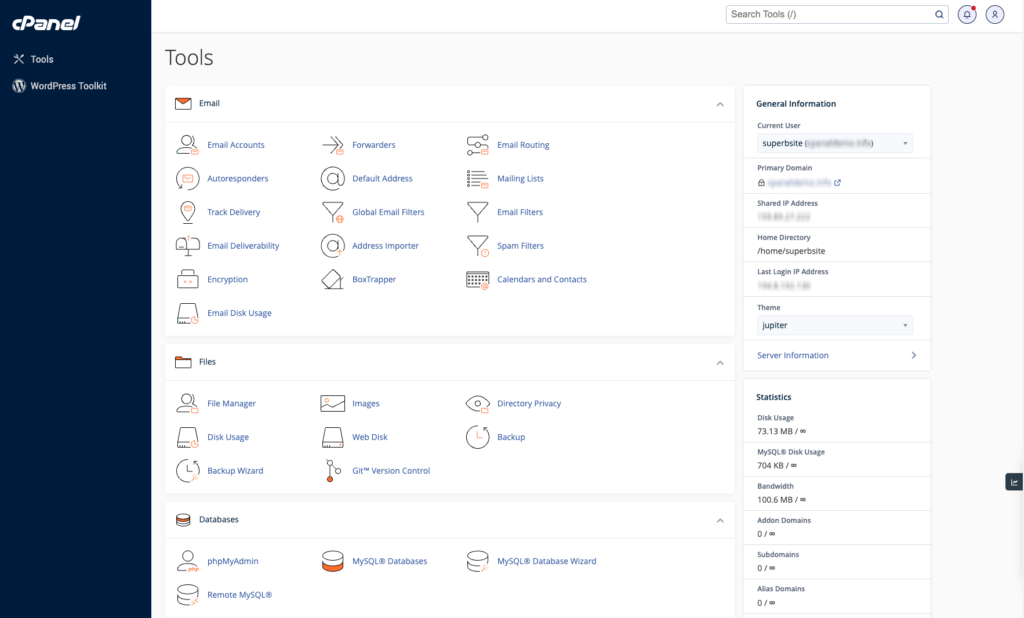
cPanel is one of the most widely known hosting control panels, trusted by hosting providers, small businesses, and individuals to efficiently manage their hosting environments. It offers a comprehensive feature set that allows users to control everything from email accounts to databases through an intuitive interface. With its high level of customization, cPanel is suitable for both newcomers to hosting and experienced administrators who need more advanced tools. The widespread adoption of cPanel is also bolstered by its strong community support and compatibility with various operating systems, making it a popular choice for many.
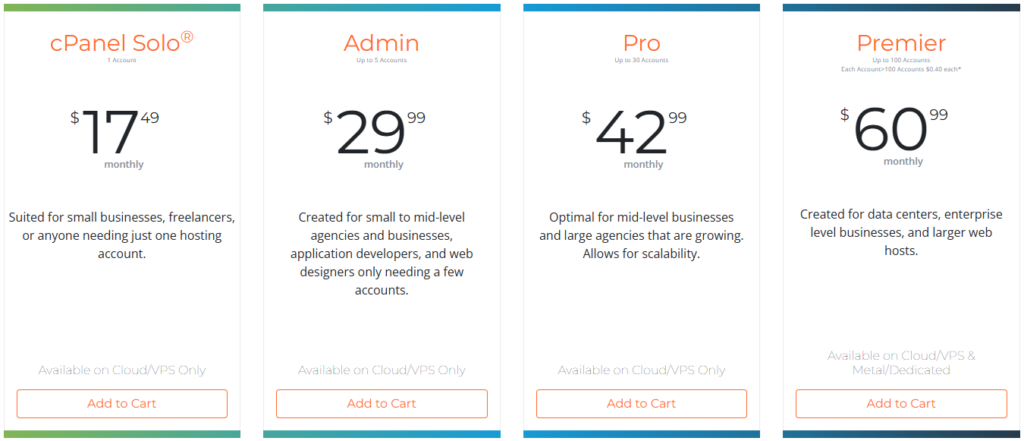
- Pros:
- User-Friendly Interface: Easy for both beginners and experienced users.
- Rich Features: One-click installations, extensive management tools for files, databases, email, and domains.
- Wide Compatibility: Works on many operating systems like CentOS, CloudLinux, and Red Hat.
- Strong Community Support: Plenty of tutorials and active forums.
- Cons:
- Pricey: One of the most expensive options, which has seen price increases in recent years.
- Resource-Intensive: Requires more server resources compared to lighter alternatives.
CyberPanel
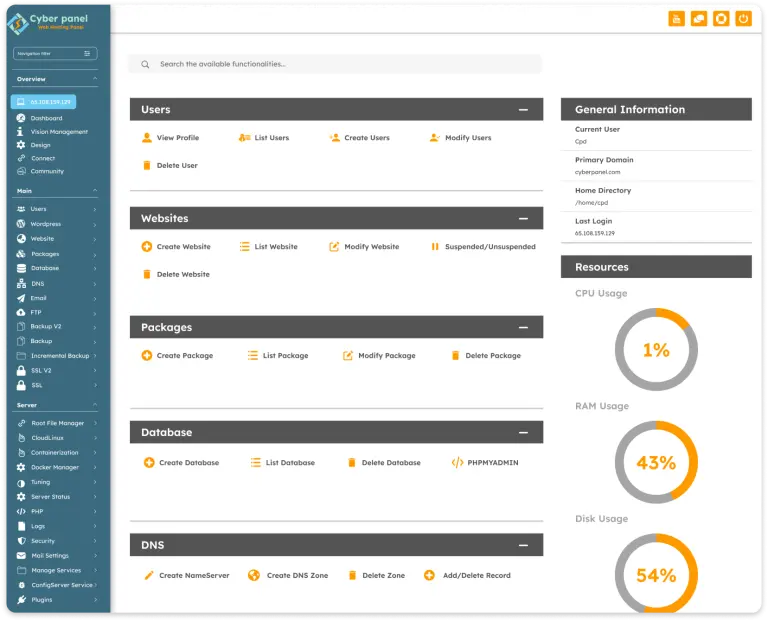
CyberPanel is an open-source hosting control panel built for OpenLiteSpeed and LiteSpeed Enterprise servers. It is designed to offer an affordable, high-performance solution for those who want to manage their web hosting efficiently without relying on proprietary software. CyberPanel is unique because it integrates natively with LiteSpeed technologies, which means it delivers faster load times, improved stability, and better resource efficiency compared to other options. Additionally, CyberPanel includes several modern features such as Docker support, one-click application installers for WordPress, Joomla, and other CMS platforms, as well as automatic SSL certificate issuance through Let’s Encrypt, making it a compelling choice for those focused on both performance and ease of use.

- Pros:
- Open-Source and Free: No licensing costs.
- High Performance: Uses LiteSpeed Web Server, known for speed and efficient handling of high traffic.
- Integrated Security Tools: Offers features like ModSecurity, Cloudflare integration, and Let’s Encrypt.
- Cons:
- Technical Knowledge Required: Users need some experience to install and manage servers.
- Limited Features: Compared to cPanel and Plesk, it lacks advanced customization options.
Webuzo
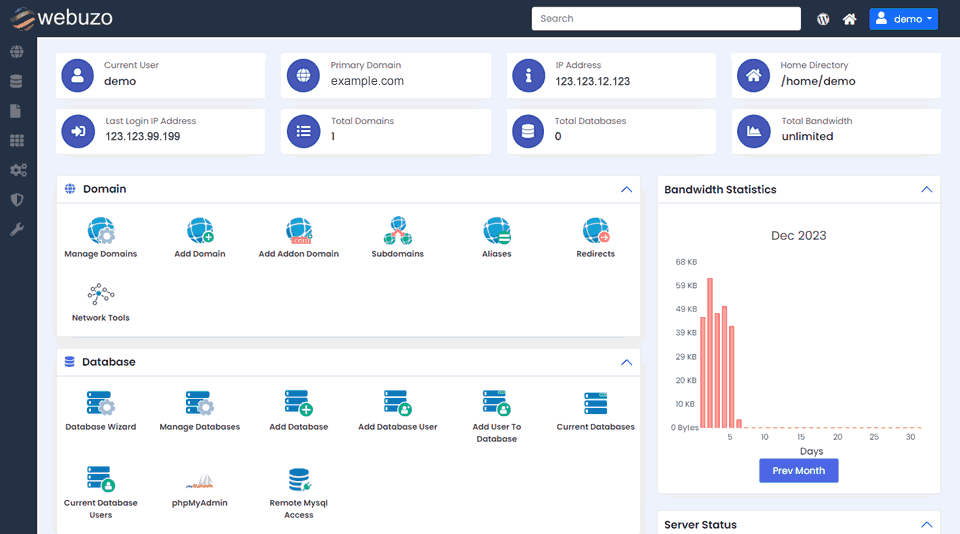
Webuzo is a control panel designed for simplicity, ideal for those starting out or running small hosting environments. It provides a straightforward interface that requires minimal technical knowledge, allowing users to quickly set up and manage websites, applications, and databases. Webuzo includes one-click installers for popular content management systems like WordPress, Joomla, and Drupal, which makes it a great choice for users who are new to web hosting. The lightweight nature of Webuzo ensures efficient resource usage, which is especially beneficial for small-scale hosting projects where server capacity is limited.
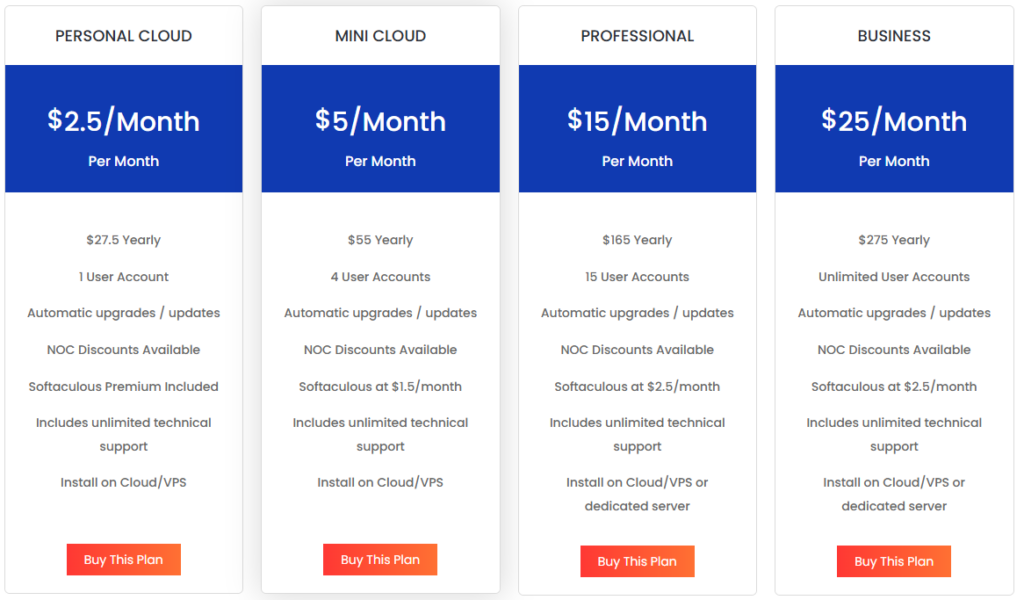
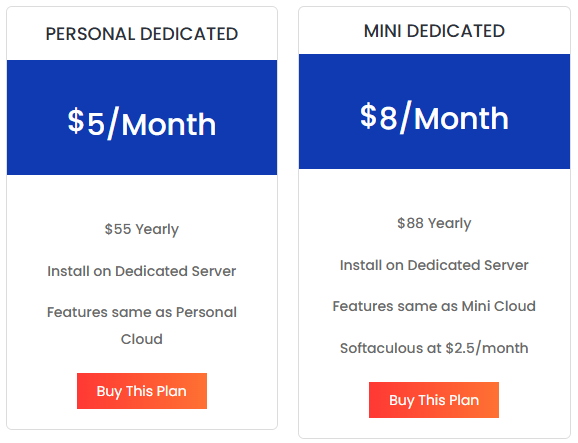
- Pros:
- Easy to Use: Very beginner-friendly with minimal configuration.
- Lightweight: Consumes fewer server resources, making it perfect for basic hosting.
- Cost-Effective: Offers an affordable license for small-scale needs.
- Cons:
- Limited Features: Lacks many advanced features found in other panels, making it unsuitable for large projects.
- Basic Customization: Offers fewer options for customization and control.
Plesk
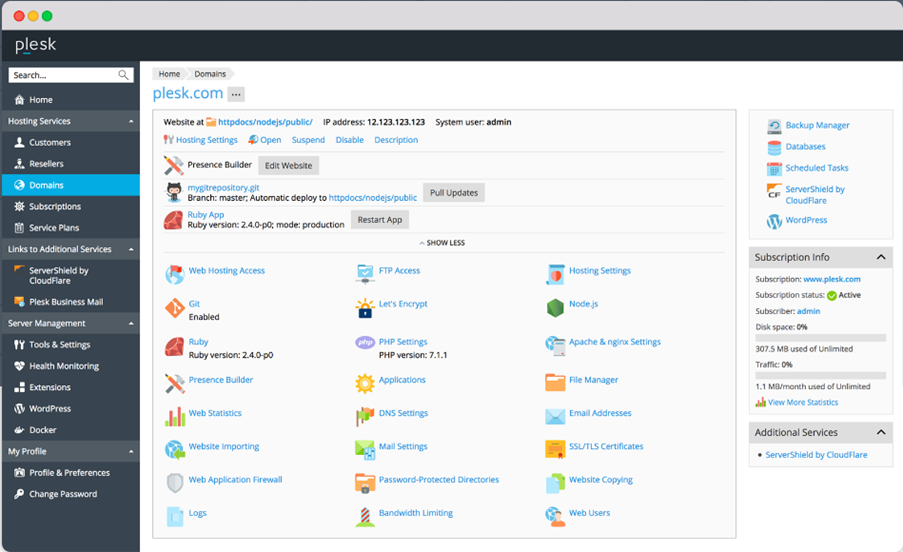
Plesk is known for its multi-platform support and flexibility, ideal for both Linux and Windows servers. It provides a unified experience for managing hosting environments, making it a popular choice among users who need cross-platform compatibility. Plesk’s versatility extends beyond just operating systems; it offers a wide range of features that cater to both developers and business owners. The platform includes powerful tools like integrated Git support, Docker integration, and a robust staging environment, making it especially appealing to developers. Additionally, Plesk emphasizes security, with features like automatic updates, SSL management, and built-in firewall protection. Despite its many benefits, Plesk can be complex for beginners due to its extensive functionality, but for those looking for a comprehensive hosting control panel, it is a reliable choice.
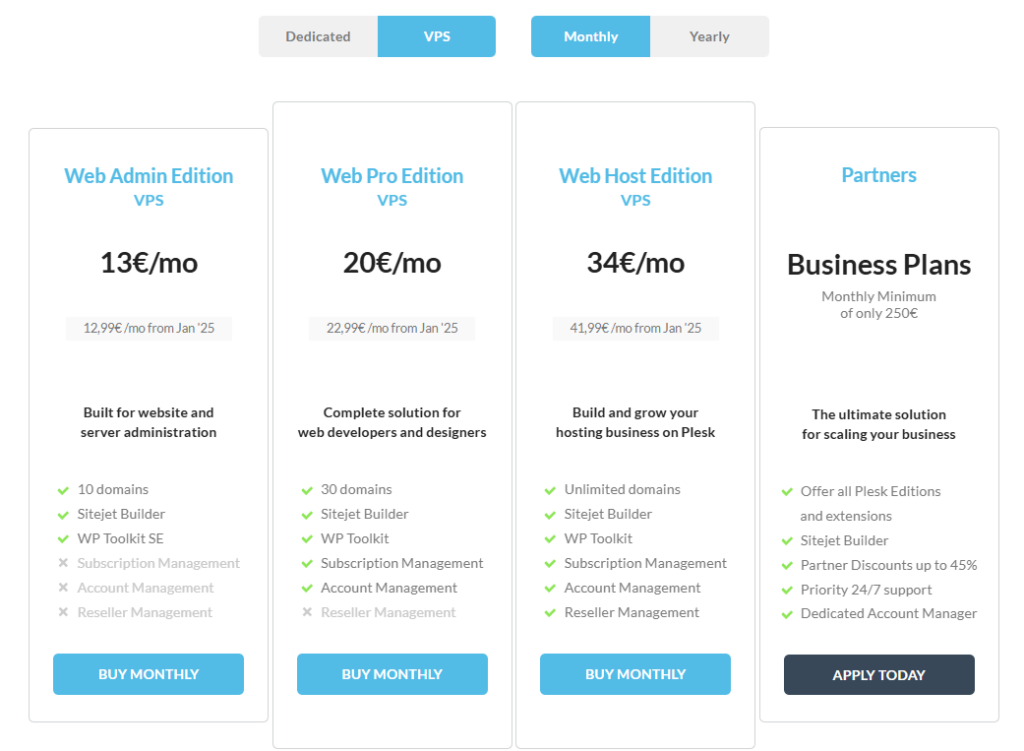

- Pros:
- Multi-Platform Support: Works on Linux and Windows, making it versatile.
- Developer-Friendly: Offers integration with Git, Docker, and other developer tools.
- Security Focused: Provides strong security tools, including SSL management and firewall integration.
- Cons:
- Costly: Like cPanel, Plesk has higher pricing that has increased over time.
- Complexity: A steeper learning curve for beginners due to the wide range of features.
DirectAdmin
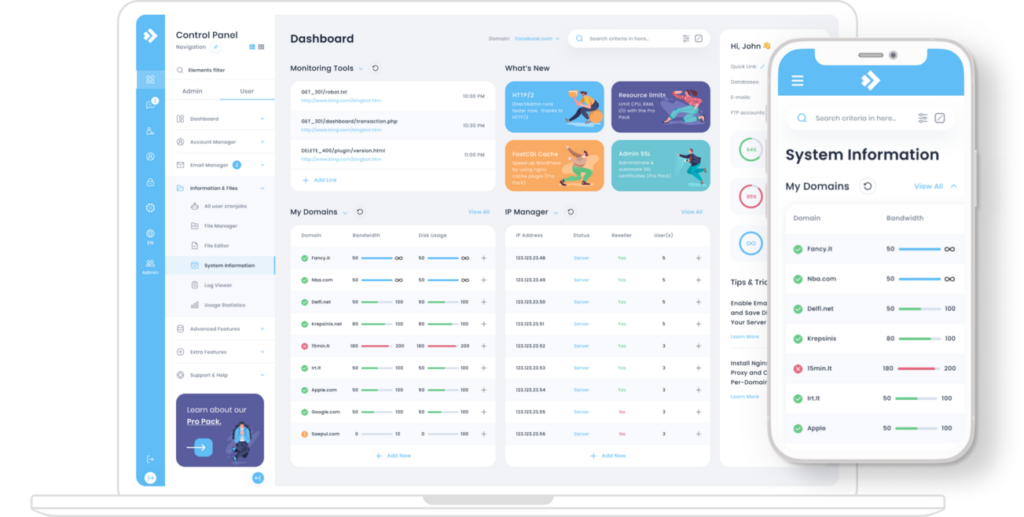
DirectAdmin is a lightweight and affordable alternative to cPanel, suitable for smaller hosting environments. It is known for its simplicity and ease of use, making it an attractive choice for beginners or small businesses looking for cost-effective hosting management. DirectAdmin offers a clean and intuitive interface that allows users to manage websites, databases, and email accounts with minimal hassle. Despite its lower price point, it includes essential features such as automated backups, multi-language support, and easy integration with various third-party applications. DirectAdmin’s resource efficiency also ensures that it runs smoothly even on servers with limited capacity, making it an excellent option for VPS hosting or shared hosting services. However, it lacks some of the advanced features that larger enterprises might need, such as extensive plugin support and complex server configurations.
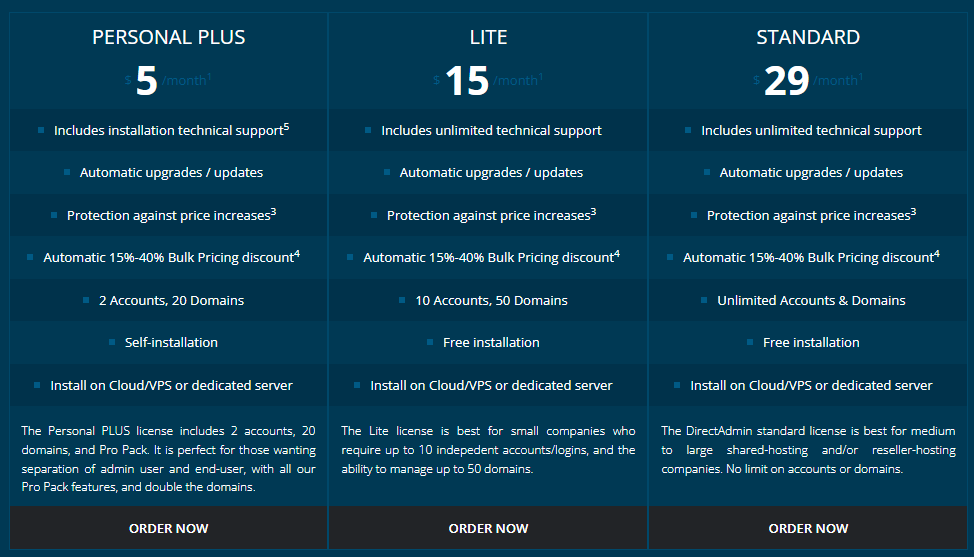
- Pros:
- Affordable: Less expensive compared to cPanel and Plesk.
- Efficient Resource Usage: Lightweight, making it ideal for servers with limited resources.
- User-Friendly: Simple interface with good customization options for appearance.
- Cons:
- Limited Advanced Features: Lacks some of the enterprise-level features offered by cPanel and Plesk.
- Not as Scalable: May not be the best choice for larger businesses that require more advanced tools.
Features comparison
| Feature | cPanel | CyberPanel | Webuzo | Plesk | DirectAdmin |
|---|---|---|---|---|---|
| User-Friendly Interface | Yes | Yes | Yes | Yes | Yes |
| One-Click Installations | Yes | Yes | Yes | Yes | Yes |
| Multi-Platform Support | No | No | No | Yes | No |
| Open Source | No | Yes | No | No | No |
| Developer Tools | Limited | Limited | No | Yes | Limited |
| Security Tools | Yes | Yes | Basic | Yes | Yes |
| Pricing | High | Free | Low | High | Medium |
| Database Management | Advanced | Limited | Basic | Advanced | Advanced |
| Customizable UI | Yes | No | No | Yes | Yes |
| Backup Tools | Advanced | Limited | Basic | Advanced | Advanced |
| Email Management | Yes | Yes | Yes | Yes | Yes |
| DNS Management | Advanced | Yes | Basic | Advanced | Advanced |
| FTP Management | Yes | Yes | Yes | Yes | Yes |
| Resource Monitoring | Advanced | Limited | Basic | Advanced | Advanced |
| Multi-User Access | Yes | No | No | Yes | Yes |
| Integration with Cloud | Yes | Limited | No | Yes | Limited |
| IPv6 Support | Yes | Yes | Yes | Yes | Yes |
| Reseller Features | Yes | No | No | Yes | Yes |
| API Support | Yes | Yes | Limited | Yes | Yes |
| Command Line Tools | Limited | Yes | No | Yes | Limited |
| Performance Optimization | Advanced | Basic | Limited | Advanced | Advanced |
| File Manager | Yes | Yes | Yes | Yes | Yes |
| Multi-Language Support | Yes | Yes | Limited | Yes | Yes |
| Automatic Updates | Yes | Yes | Limited | Yes | Yes |
| SSL Management | Yes | Yes | Basic | Yes | Yes |
| Staging Environment | Yes | No | No | Yes | No |
| Cluster Management | No | Limited | No | Yes | Limited |
| Docker Support | No | Yes | No | Yes | No |
| Load Balancing | No | Limited | No | Yes | Limited |
| Support for LiteSpeed | Yes | Yes | Limited | Yes | Yes |
| Marketplace Add-Ons | Yes | Limited | Limited | Yes | Yes |
| Mobile App Management | Yes | No | No | Yes | Limited |
Pricing Summary
Each control panel has its strengths and weaknesses, and pricing is an important factor in your decision. Below, you will find a summary of pricing to help you better understand the cost differences between these options.
Segment 1 – Best value options
- Vebuzzo Personal Cloud: at just $2.5/month, this is the cheapest option for individuals or small setups requiring basic hosting with 1 user account. It includes automatic updates, Softaculous, and technical support. Ideal for minimal requirements at a very low price point.
- DirectAdmin Personal Plus: priced at $5/month, this plan includes 2 accounts and 20 domains, making it a great choice for small-scale users who need some flexibility. The self-installation feature might not suit non-technical users but is affordable for those who can manage setup.
Segment 2 – Balanced features and pricing
- Plesk Web Admin Edition (Dedicated and VPS): at €13/month, this plan supports up to 10 domains and includes useful tools like Sitejet Builder and WP Toolkit SE. It’s a good middle ground for developers managing multiple sites without needing advanced reseller features.
- DirectAdmin Lite: for $15/month, this plan offers 10 accounts and up to 50 domains. It also includes unlimited technical support and free installation, which adds significant value for small to mid-size businesses.
Segment 3 – Premium and enterprise segments
- Plesk Web Host Edition (Dedicated): priced at €57/month, this plan offers unlimited domains, making it ideal for large-scale businesses or hosting providers. It includes comprehensive management tools and reseller management, justifying its price.
- cPanel Premier: at $60.99/month, it allows up to 100 accounts and targets data centers and enterprise businesses. Each additional account costs $0.40, making it scalable but expensive if the user exceeds the limit.
Segment 4 – Most expensive options
- Plesk Partners Plan: at a minimum of €250/month, this is the most expensive plan, tailored for hosting providers or resellers needing extensive tools, support, and high scalability. It’s justified only for large-scale operations.
- cPanel Pro and Premier: both plans are among the costliest for their respective account limits, with $42.99/month (Pro) and $60.99/month (Premier). They’re suitable for growing and enterprise-level hosting businesses but not cost-effective for smaller setups.
Segment 5 – Observations on scalability
- DirectAdmin Standard: for $29/month, this plan includes unlimited accounts and domains, making it one of the best deals for resellers or large agencies needing scalability without high costs.
- Vebuzzo Business (Cloud): at $25/month, this plan includes unlimited accounts, Softaculous, and technical support, making it an affordable option for small hosting providers or businesses with high user needs.
Recommendations
- Budget Users: Vebuzzo Personal Cloud or DirectAdmin Personal Plus.
- Small to Mid-size Agencies: Plesk Web Admin Edition or DirectAdmin Lite.
- Large Businesses and Resellers: DirectAdmin Standard or Plesk Web Host Edition.
- Enterprise and Specialized Hosting: Plesk Partners Plan or cPanel Premier for scalability and advanced features.
The choice ultimately depends on the user’s specific needs, such as the number of domains, accounts, and additional features required.
So..
Choosing the right hosting control panel depends on your needs and budget. cPanel and Plesk are feature-rich but come at a higher cost, with recent price hikes being a factor to consider. DirectAdmin is a cost-effective option for smaller environments, while Webuzo is a great lightweight solution for beginners. CyberPanel, as an open-source alternative, offers great value with solid performance features.
Consider the features and pricing carefully, and choose a panel that best fits your specific needs. Remember, with cPanel and Plesk increasing their prices yearly, cost can quickly add up, especially for smaller businesses.
In upcoming articles, we will explore free hosting control panel solutions that can be used for very budget-friendly hosting offers. These solutions have strong community support and receive funding from larger competitors to help with their development.
Kamil Kołosowski
Author of this post.
